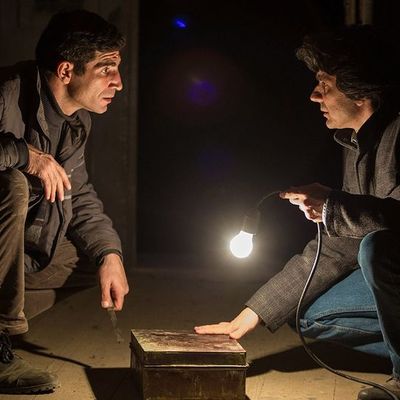
Drolly funny and rigorously executed, Corneliu PorumbouiÔÇÖs┬áThe Treasure┬áoffers a fine example of the conceptual boldness that characterizes much of New Wave Romanian cinema. To anyone watching the filmÔÇÖs early scenes, ÔÇ£boldnessÔÇØ may seem like the very last word to use: Stylistically, most of┬áThe Treasure┬áis characterized by a dry functionality that speaks to the bureaucratic, financial, legalistic goings-on in the film. But thatÔÇÖs kind of the point. And itÔÇÖs all going somewhere, trust me.
When we first see our hero, Costi (Toma Cuzin), heÔÇÖs late to pick up his young son from school; he tells the boy that he wasnÔÇÖt late but just hiding, like Robin Hood, their favorite bedtime story. That night ÔÇö not coincidentally, as heÔÇÖs reading┬áRobin Hood┬áto the boy ÔÇö CostiÔÇÖs upstairs neighbor Adrian (Adrian Purcarescu) visits and asks for an 800 euro loan. A sad sack unable to pay his mortgage ever since his brochure-publishing company folded after the financial crisis, Adrian is desperate. But Costi himself has obligations, too, and canÔÇÖt help. (HeÔÇÖs no Robin Hood, as his son reminds him.) The next day, Adrian returns and reveals the real reason he needs the money: His great-grandfather supposedly buried a trove of gold coins back in their village years ago, before the communists came, and Adrian has to pay a metal detector to help him go find it. He offers to split any potential find with Costi if he will help.┬áAnd theyÔÇÖre off!
But wait ÔÇö before they can┬ágo off!, Costi has to wade through some exceedingly, hilariously dull minutiae. First, he has to figure out how heÔÇÖs going to find the 800 euros in the first place. Then he has to go off to negotiate a price with the metal detector guy (they have to calculate Value Added Tax, and gas, and a weekend-only schedule), and to even go there Costi has to skip out on work, and to do that he has to lie to his boss about some kind of landlord dispute, and he also has to convince his co-worker to help him out, and remind her of that other time when he helped┬áher┬áout. And then the metal detector guy reminds Costi of a law that says that if they find anything that could be considered part of Romanian national heritage (gold coins from before World War II would certainly qualify), they have to hand it over to the government, which would in turn give them only 30 percent. And then later Costi has to lie to his boss again, after the guy gets a wind of something. And then there are the GPS directions ÔÇö oh god, the GPS directions ÔÇö droning on in the background as he goes from place to place.
Porumboui, whose art lies in the way he toys with the endless drip-drip-drip of quotidian bullshit, makes sure to film every scene like some kind of drab business negotiation ÔÇö static two-shots of people sitting across each other in profile, or dry alternating medium close-ups. Costi has conversations with Adrian and his wife against the same blank wall in his house. His office walls are even barer, if such a thing is possible. Standard filmmaking practice says to design and arrange and shoot spaces so theyÔÇÖll actually look interesting on a screen. Porumboui turns that around. He makes sure everything looks distractingly┬áuninteresting, which actually makes it all even more fascinating.
Everything in┬áThe Treasure┬áis so stultifying and drab that whenever someone mentions ÔÇ£treasure,ÔÇØ itÔÇÖs like a momentary, surreal breach in the dreary time-space continuum of this film. One suspects thereÔÇÖs some national allegory happening here: Romanian bureaucracy has been a prime target for Porumboui and his fellow filmmakers, who also work in an industry thatÔÇÖs reportedly been consumed by byzantine laws and government meddling. But thereÔÇÖs a universality to this film as well. It speaks to the real worldÔÇÖs capacity to beat down all our dreams.
Things get even more pointedly repetitive and dry when our heroes finally head off to the village. Here, after some more GPS directions, we get to spend quality time with dumpy, gruff Cornel (Corneliu Cozemi), the metal detector guy, as he wanders around the backyard of AdrianÔÇÖs old abandoned family home, reading off numbers from a computer and waving his detector around; the┬ábloooeeep blooeeeeeeeeÔÇÖing of the detector on the soundtrack might even drive some screaming out of the theater.
Slowly, though, something changes, and the functionality of PorumbouiÔÇÖs style gives way to an ever-so-slight hint of wonder. The wind whispers in the trees. A character wanders amid the haze of dusk. Night settles, and little spots of light gain a mystical quality. Still, thereÔÇÖs more negotiation and back-and-forth and talk on the way. But it all builds to one final, magical release. In the filmÔÇÖs very last shot ÔÇö I wonÔÇÖt say what actually happens in it ÔÇö the camera moves and twists and lifts up, up, up, as if itÔÇÖs finally conquered and transformed the hollow reality around us. It provides a sublime, wonderfully open-ended punctuation mark to this subtly daring little film. DonÔÇÖt be surprised if your eyes start to well up.


